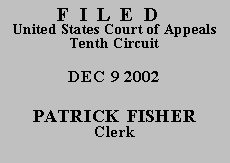

| MICHAEL L. PAOLONE, |
|
Mr. Paolone was found guilty by a jury in Utah state court of one count of forcible sexual abuse and sentenced from one to fifteen years. I R. Doc. 10 at 1. Though he did not file any direct appeal of his conviction, he did file state petitions for post-conviction relief, which were denied by the Utah courts. On November 2, 2000, Mr. Paolone filed his federal habeas petition. The district court dismissed the petition as time-barred on September 26, 2001. Although Mr. Paolone did not file his notice of appeal within 30 days of that date pursuant to Fed. R. App. P. 4(a)(1)(A), he did file a request for a COA on October 12, 2001. We construe that request as the functional equivalent of a timely notice of appeal. See Smith v. Barry, 502 U.S. 244, 248-49 (1992); Rodgers v. Wyo. Attorney General, 205 F.3d 1201, 1205 (10th Cir. 2000).
Pursuant to AEDPA, a state prisoner generally has one year from the date his conviction becomes final to file a petition for a writ of habeas corpus in federal court. See 28 U.S.C. § 2244(d)(1) ("A 1 year period of limitation shall apply to an application for a writ of habeas corpus by a person in custody pursuant to the judgment of a State court."). The AEDPA one-year limitation period is tolled during the time in which a "properly filed application for State post-conviction or other collateral review with respect to the pertinent judgment or claim is pending," 28 U.S.C. § 2244(d)(2). Mr. Paolone's conviction became final on September 13, 1996, and he did not file his state law post-conviction petition until February 27, 1997, thereby allowing more than five months of the one-year limitation period to pass. Mr. Paolone's state post-conviction claims were pending from February 27, 1997, to November 16, 1999, until the Utah Court of Appeals affirmed the dismissal of his petition. He did not file a petition for a writ of certiorari with the Utah Supreme Court.(1) Mr. Paolone did not file his federal habeas petition until November 2, 2000, well after a year had passed under § 2244(d).
The one-year statute of limitations may be equitably tolled, although only "when an inmate diligently pursues his claims and demonstrates that the failure to timely file was caused by extraordinary circumstances beyond his control." Marsh v. Soares, 223 F.3d 1217, 1220 (10th Cir. 2000). Mr. Paolone has the burden of demonstrating that equitable tolling should apply. See Miller v. Marr, 141 F.3d 976, 978 (10th Cir. 1998).
Mr. Paolone argues that equitable tolling should apply because the Utah State Prison lacks a legal research facility and because he was dependent upon two contract attorneys who provide legal assistance to the entire Utah Department of Corrections System to provide him information about AEDPA. Thus, Utah has created an impediment under § 2244(d)(1)(B), which provides that the limitations period commences on "the date on which the impediment to filing an application created by State action in violation of the Constitution or laws of the United States is removed, if the applicant was prevented from filing by such state action." He relies upon Easterwood v. Champion, 213 F.3d 1321, 1323 (10th Cir. 2000), where we recognized that a prisoner cannot exercise due diligence with respect to obtaining legal materials before the prison law library has received them. He contends that the district court should have held an evidentiary hearing to investigate his claims.
Mr. Paolone's claim is insufficient, however, because he does not allege specific facts that demonstrate how the alleged denial of these materials impeded his ability to file a federal habeas petition, only that he was unaware of the one-year AEDPA deadline. Aplt. Br. at 21; cf. Marsh, 223 F.3d at 1220 ("[I]t is well established that 'ignorance of the law, even for an incarcerated pro se petitioner, generally does not excuse prompt filing.'") (citations omitted); Miller, 141 F.3d at 978 (rejecting § 2244(d)(1)(B) claim of impediment from constitutionally inadequate access to legal materials, holding "[i]t is not enough to say that the . . . prison facility lacked all relevant statutes and case law or that the procedure to request specific materials was inadequate"). Mr. Paolone has had since September of 1996 to file his federal habeas petition; there simply is no evidence that he diligently pursued his federal claims during the limitation period and was somehow misled by the state about his rights.
Accordingly we DENY Petitioner's request for a COA, DENY Petitioner's request to proceed in forma pauperis as moot, and DISMISS the appeal.
Entered for the Court
Paul J. Kelly, Jr.
Circuit Judge
*. This order and judgment is not binding precedent, except under the doctrines of law of the case, res judicata, and collateral estoppel. This court generally disfavors the citation of orders and judgments; nevertheless, an order and judgment may be cited under the terms and conditions of 10th Cir. R. 36.3.
2. After examining the briefs and the appellate record, this three-judge panel has determined unanimously that oral argument would not be of material assistance in the determination of this appeal. See Fed. R. App. P. 34(a); 10th Cir. R. 34.1(G). The case is therefore ordered submitted without oral argument.
1. Because he did not file for such review, it appears that he has not properly exhausted his remedies in state court and his claims are procedurally barred. See 28 U.S.C. § 2254(b)(1); O'Sullivan v. Boerckel, 526 U.S. 838, 844 (1999); Utah Code Ann. § 78-35a-110; Utah R. Civ. P. 65C(o).